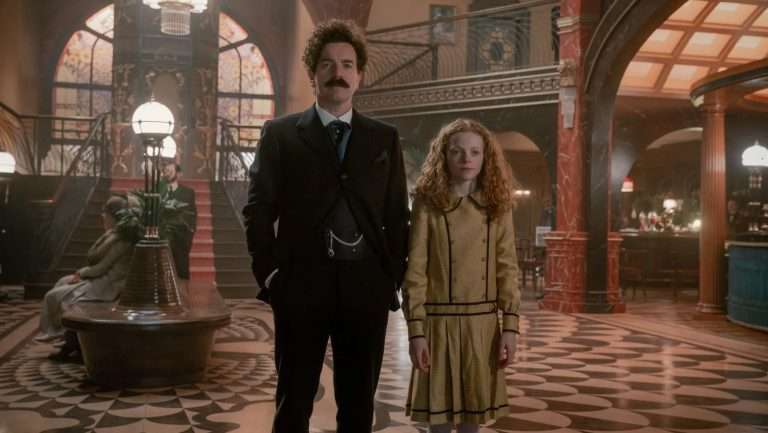Looking back at your past to revive a feeling. Hidden in the burrows of history. Some cherishable moments kept safely in a closet. Where only we can access them. Privately and with an aching sadness in our hearts. We don’t know whether we lost the memory or the people we knew became strangers. The dynamic process of growth and change makes us distant from the people we felt closest to in our yesteryears. Aftersun (2022), directed by Charlotte Wells, confronts this anomaly through an absorbing father-daughter relationship.
Sophie, a charming 11-year-old girl, goes on a vacation to Turkey with her dad, Calum, where they bond and bicker over petty trivialities and small yet significant pleasures. She shares her worries and fears – how much she wishes to see him married to her mom (they are not together anymore) while he keeps his tribulations only to himself.
There are tender moments of beauty throughout the movie. A lot of drama unfolds through the unspoken and unsaid. When she catches him off-guard about his smoking, he advises her not to do so and quickly changes the topic. When she inquires about his aspirations in his childhood, he is visibly distraught – hinting that all did not go according to plan. Paul Mescal embodies the weary, downbeat father trying his best to enliven his kid. His eyes conceal layers of insecurities that show up from time to time. There is a scene where he refuses to sing with her at the Karaoke and later gets drunk and passes out on her bed. The next morning, he cries at the bedside (Wells does not show his face – a clever and apt decision) and earnestly apologizes for his behavior. He excels in bringing out the nuances of his character.
The girl Sophie, played by Frankie Corio, is a revelation. She moves, talks, and behaves in the loveliest manner, giving vivid gestures and subtle reactions. In the scenes where she sees young adults engrossed in discussing boyfriends, making out, and other adult stuff, her curiosity mixed with understanding is pure joy. When the girls outside the lavatory comment that she would not understand their talk as she is just a nine-year-old, her ingenious smile conveys all we need to know.

The background score by Oliver Coates is sparse and understated. Wherever it appears briefly, it creates a mellow, breezy mood, with its rhythmic droning and strumming, like we are diving into someone’s memories. It elevates certain scenes, like the one where they go underwater or the one in which they rub clay over their bodies. The songs blend with the visuals to create the ethos – the one song Sophie sings at the karaoke reveals her inner desire for her father to be by her side and sing with her. There is not much heavy influence of the soundtrack on the proceedings. But it does not distract from the poetic realism of the movie either.
The super eight home video recordings are a special delight, adding to the nostalgic atmosphere. Most shots employ brightly lit spaces with high-key lighting, keeping the characters and their surroundings in the frame. They are present in nearly every scene, which keeps us connected to their relationship. The exotic aura of the locale never interferes with their conversations and becomes a shared space for unveiling each other.
But like so many mysteries of life, there are aspects of Calum’s life that remain elusive to Sophie. It is hinted that as she grew up, she became distant from her father. He only appears in a dream where she is trying to save him from falling into darkness but fails. There is no concrete evidence for what happened to their relationship. Wells is wise enough to let her art thrive in ambiguity. Those dance sequences with adult Sophie appear intermittently like fragments of inexplicable importance. Only at the end, when the super eight recording transitions into her living room television, do we grasp the implications of those scenes.
Perhaps she was trying to nitpick those elements which made that vacation special. Maybe he went broke and never came back to her again. Or maybe he died. We cannot know for sure. The only thing we understand is the importance these moments, which we just saw unfold in front of us, hold for her. They may have differences, but the parental concerns and her sense of attachment were genuine. Wells succeeds in bringing out these emotions without any contrived efforts. There is no plot, only a brief glimpse of a beautiful relationship. And that alone makes it worth watching. A triumphant feat that is both honest and sincere in its ambitions.


![Boogie Nights [1997]: An Impeccably Crafted Homage To The ‘Golden Age of Porn’](https://79468c92.delivery.rocketcdn.me/wp-content/uploads/2018/02/boogie-nights-768x320.jpg)



